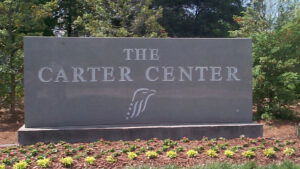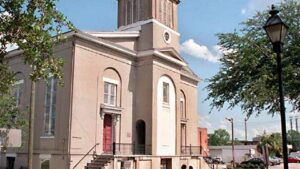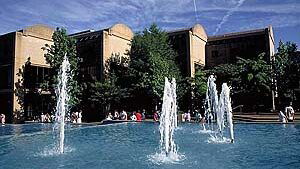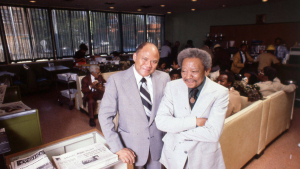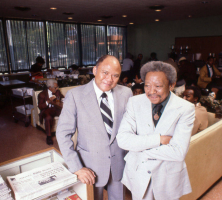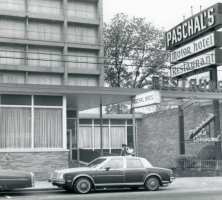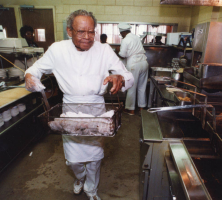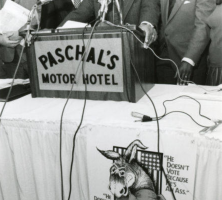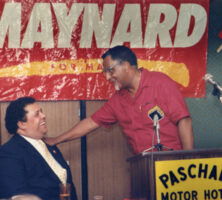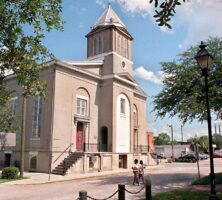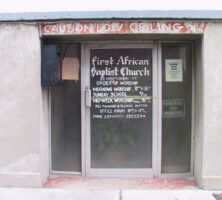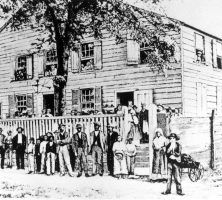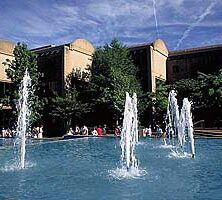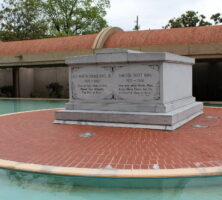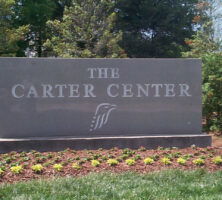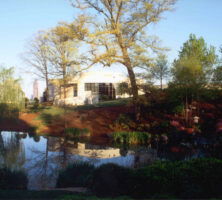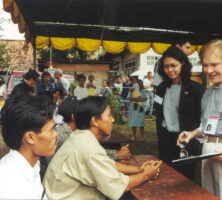The New Georgia Encyclopedia is supported by funding from A More Perfect Union, a special initiative of the National Endowment for the Humanities.
James and Robert Paschal opened Paschal Brothers Soda, a thirty-seat luncheonette at 837 West Hunter Street, in 1947. They are pictured here in 1978.
Courtesy of Special Collections & Archives, Georgia State University Library, Atlanta Journal-Constitution Photographic Archive.
The New Georgia Encyclopedia does not hold the copyright for this media resource and can neither grant nor deny permission to republish or reproduce the image online or in print. Requests for permission to publish or reproduce the resource should be submitted to Special Collections and Archives at Georgia State University.
In 1967 Paschal’s underwent a major expansion with the addition of a six-story, 120-room motel. Paschal’s Motor Hotel was the first Black-owned hotel in Atlanta.
Courtesy of Special Collections & Archives, Georgia State University Library, Atlanta Journal-Constitution Photographic Archive.
The New Georgia Encyclopedia does not hold the copyright for this media resource and can neither grant nor deny permission to republish or reproduce the image online or in print. Requests for permission to publish or reproduce the resource should be submitted to Special Collections and Archives at Georgia State University.
Robert Paschal prepares the restaurant's famous fried chicken, the recipe for which remains a secret to this day.
Courtesy of Special Collections & Archives, Georgia State University Library, Atlanta Journal-Constitution Photographic Archive.
The New Georgia Encyclopedia does not hold the copyright for this media resource and can neither grant nor deny permission to republish or reproduce the image online or in print. Requests for permission to publish or reproduce the resource should be submitted to Special Collections and Archives at Georgia State University.
Representative John Lewis speaks for Atlanta' Concerned Black Clergy at Paschal's Restaurant in 1988. The relationships that James and Robert Paschal built within the city’s Black community made Paschal’s a central meeting spot during the civil rights movement and helped earn the restaurant its reputation as Atlanta’s “Black City Hall.”
Courtesy of Special Collections & Archives, Georgia State University Library, Atlanta Journal-Constitution Photographic Archive.
The New Georgia Encyclopedia does not hold the copyright for this media resource and can neither grant nor deny permission to republish or reproduce the image online or in print. Requests for permission to publish or reproduce the resource should be submitted to Special Collections and Archives at Georgia State University.
Reverend Joseph E. Lowery (right) and mayoral candidate Maynard Jackson at a 1989 campaign event at Paschal's Motor Hotel. Paschal’s was a hotbed of political activity for Atlanta’s African American community.
Courtesy of Special Collections & Archives, Georgia State University Library, Atlanta Journal-Constitution Photographic Archive.
The New Georgia Encyclopedia does not hold the copyright for this media resource and can neither grant nor deny permission to republish or reproduce the image online or in print. Requests for permission to publish or reproduce the resource should be submitted to Special Collections and Archives at Georgia State University.
First African Baptist Church, which was established during the 1770s, played an important part in the Savannah civil rights movement. The stained-glass windows in the current church building, located at 23 Montgomery Street in Savannah, feature prominent Black leaders.
Photograph by Carl Elmore. Courtesy of Savannah Morning News
The New Georgia Encyclopedia does not hold the copyright for this media resource and can neither grant nor deny permission to republish or reproduce the image online or in print. All requests for permission to publish or reproduce the resource must be submitted to the rights holder.
A museum housing artifacts and church memorabilia dating to the eighteenth century is housed on the grounds of First African Baptist Church in Savannah. One of the oldest Black churches in the nation, First African has occupied its current site on Montgomery Street since 1859.
Photograph by Sarah E. McKee, New Georgia Encyclopedia
The New Georgia Encyclopedia does not hold the copyright for this media resource and can neither grant nor deny permission to republish or reproduce the image online or in print. All requests for permission to publish or reproduce the resource must be submitted to the rights holder.
This post-Civil War sketch depicts members of Savannah's First Bryan Baptist Church, named after early Baptist minister Andrew Bryan, congregating outside the church building. The church is one of the oldest Black churches in North America.
Photograph by James M. Simms
The New Georgia Encyclopedia does not hold the copyright for this media resource and can neither grant nor deny permission to republish or reproduce the image online or in print. All requests for permission to publish or reproduce the resource must be submitted to the rights holder.
The Martin Luther King Jr. Center for Nonviolent Social Change, located in the Sweet Auburn district of Atlanta, was established in King's memory by his family in 1968. Today the center, which houses a library and archives, strives to fulfill King's vision of social justice through a variety of programs and services.
Courtesy of Georgia Department of Economic Development.
The New Georgia Encyclopedia does not hold the copyright for this media resource and can neither grant nor deny permission to republish or reproduce the image online or in print. Requests for permission to publish or reproduce the resource may need to be submitted to the Georgia Department of Economic Development.
In 1970, during the dedication ceremony for the King Center complex in Atlanta, the remains of civil rights leader Martin Luther King Jr. were relocated to a crypt at the center. The reflecting pool surrounding the crypt was completed in 1977. King's wife, Coretta Scott King, was interred beside him in 2006.
Image from Wally Gobetz
The New Georgia Encyclopedia does not hold the copyright for this media resource and can neither grant nor deny permission to republish or reproduce the image online or in print. All requests for permission to publish or reproduce the resource must be submitted to the rights holder.
Situated on a thirty-five-acre park, atop a hill between downtown Atlanta and Emory University, the Carter Center is a nongovernmental, not-for-profit organization established in 1982 by former U.S. president Jimmy Carter and his wife, Rosalynn, to advance peace and health worldwide.
Courtesy of the Carter Center
The New Georgia Encyclopedia does not hold the copyright for this media resource and can neither grant nor deny permission to republish or reproduce the image online or in print. All requests for permission to publish or reproduce the resource must be submitted to the rights holder.
Founded by Jimmy and Rosalynn Carter, the center is governed by an independent board of trustees. The board oversees the center's assets and property and promotes its objectives and goals.
Courtesy of the Carter Center
The New Georgia Encyclopedia does not hold the copyright for this media resource and can neither grant nor deny permission to republish or reproduce the image online or in print. All requests for permission to publish or reproduce the resource must be submitted to the rights holder.
Rosalynn Carter observes an election in Indonesia as part of her humanitarian work with the Carter Center.
Courtesy of the Carter Center
The New Georgia Encyclopedia does not hold the copyright for this media resource and can neither grant nor deny permission to republish or reproduce the image online or in print. All requests for permission to publish or reproduce the resource must be submitted to the rights holder.
